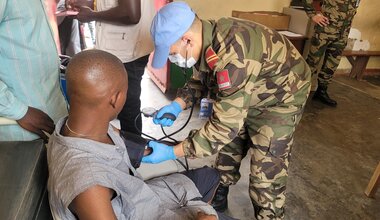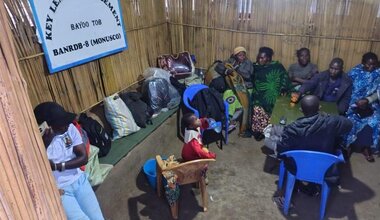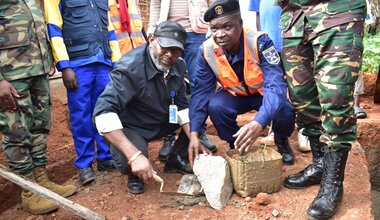Islands of stability, a stabilization instrument in the liberated territories
The defeat of the March 23 Movement and the dismantling of armed groups have contributed to the emergence of islands of stability in the eastern part of the Democratic Republic of the Congo.
The islands of stability provide the Congolese Government, in partnership with MONUSCO, with an intervention framework for the progressive restoration of the authority of the state after a significant period of absence. Specifically, joint civilian teams are deployed to remote areas recently liberated from armed groups in order to support the State in its role of administrator and build capacity in the local administration, the justice system and the police. The islands of stability have the advantage of complementing joint military interventions with civilian interventions consisting of support and advice for the Government in the rebuilding process of state functions. The islands of stability are within the framework of the Security Council resolution 2147 which defines MONUSCO’s mandate to protect and stabilize. In 2014, ten islands of stability were set up in North Kivu, Province Orientale and Katanga.
In early January 2015, Barry Aliou was sent by the Civil Affairs Section to Luofo to help establish an island of stability in South Lubero. Assisted by two Community liaison officers, Barry had as mission to identify civil society activists with the aim of creating future partnerships between civil society groups and his section: ‘’ My job was to explain the function of civil society and the importance of their neutrality and involvement,’’ says Barry. In the islands of stability, civil society groups are key partners of local authorities in their efforts to get closer to the local population and raise awareness about peaceful coexistence.
Barry was also involved in the creation of six Local Stabilization Committees for the South Lubero area. ‘’The committees comprise local authorities and civil society activists and their function is to promote an inclusive dialogue between, on one hand, existing local authorities and on the other hand, civil society activists such as traditional and religious leaders, youth, women groups’ representatives, etc., ‘’ says Barry.
‘’I am happy to have participated in the creation of an island of stability,’’ said Barry. ‘’It’s an amazing experience that has allowed me to be at the heart of the MONUSCO peacekeeping mandate and to observe the practical implementation of the mandate on the ground as well as our contribution to the consolidation of the State. ‘’
 UN
UN United Nations Peacekeeping
United Nations Peacekeeping






